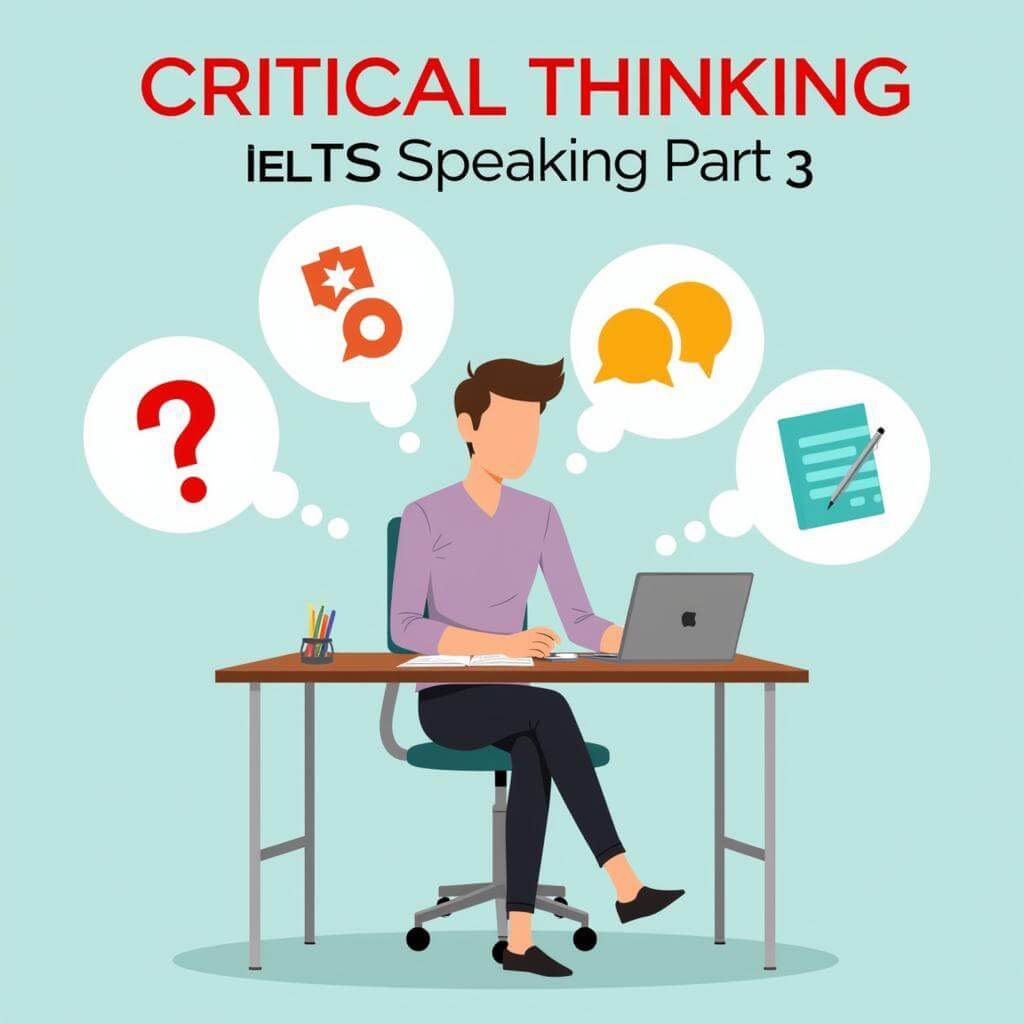IELTS Speaking Part 3 can be challenging, but with the right approach, you can significantly improve your score. This section tests your ability to discuss abstract ideas and opinions on a variety of topics. Let’s explore effective strategies to enhance your performance and achieve a higher band score in this crucial part of the IELTS Speaking test.
Understanding the IELTS Speaking Part 3 Format
Before diving into improvement strategies, it’s essential to grasp what examiners are looking for in Part 3:
- In-depth responses to abstract questions
- Well-developed ideas and opinions
- Fluent and coherent speech
- Appropriate use of vocabulary and grammar
- Ability to discuss complex topics
Knowing these expectations will help you tailor your preparation more effectively.
Key Strategies to Elevate Your Performance
1. Expand Your Vocabulary
A rich vocabulary is crucial for expressing complex ideas. Here’s how to enhance it:
- Read widely on various topics
- Learn synonyms and antonyms
- Study academic word lists
- Use new words in context regularly
Remember, it’s not just about knowing more words, but using them accurately and appropriately.
2. Practice Developing Complex Answers
To excel in Part 3, you need to how to develop complex answers quickly. Here’s a simple structure to follow:
- State your main idea
- Explain your reasoning
- Provide an example
- Discuss implications or related aspects
This approach ensures your answers are comprehensive and well-structured.
3. Improve Your Critical Thinking Skills
Part 3 often requires you to analyze and evaluate ideas. Enhance your critical thinking by:
- Questioning assumptions
- Considering multiple perspectives
- Analyzing cause and effect
- Evaluating evidence and arguments
These skills will help you provide more insightful and thoughtful responses.

4. Master the Art of Paraphrasing
Paraphrasing is essential for clarifying your ideas and demonstrating language flexibility. Practice:
- Restating concepts in your own words
- Using synonyms and alternative sentence structures
- Explaining complex ideas in simpler terms
This skill not only improves your speaking but also helps you better understand the examiner’s questions.
5. Enhance Your Fluency and Coherence
Smooth, well-connected speech is crucial for a high score. Improve by:
- Using a variety of linking words and phrases
- Practicing speaking on random topics for extended periods
- Recording yourself and analyzing your speech patterns
“Fluency in IELTS Speaking Part 3 is about maintaining a steady flow of ideas, not just speaking quickly,” advises Dr. Emily Watson, IELTS Speaking Examiner with 15 years of experience.
6. Develop Strategies for Handling Unfamiliar Topics
You might encounter topics you’re not familiar with. Here’s how to handle them:
- Stay calm and composed
- Use general knowledge to relate to the topic
- Ask for clarification if needed
- Draw from personal experiences to support your points
Remember, the examiner is assessing your language skills, not your expertise on the topic.
Practical Tips for Test Day
- Listen carefully to the examiner’s questions
- Take a moment to gather your thoughts before answering
- Maintain eye contact and confident body language
- Don’t be afraid to ask for clarification if needed
- Use fillers wisely to avoid long pauses
Common Pitfalls to Avoid
- Memorizing scripted answers
- Giving overly brief responses
- Straying off-topic
- Using overly simple language
- Focusing on fluency at the expense of accuracy
By being aware of these pitfalls, you can consciously work to avoid them during your test.
The Importance of Regular Practice
Consistent practice is key to improving your IELTS Speaking Part 3 performance. Consider:
- Joining speaking clubs or language exchange programs
- Practicing with a study partner or tutor
- Using IELTS preparation apps and online resources
- Engaging in debates or discussions on various topics
Regular practice helps build confidence and improves your ability to think on your feet.
Using specific examples in speaking can significantly enhance the quality of your responses. It adds credibility to your arguments and demonstrates your ability to apply abstract concepts to real-life situations.
Conclusion
Improving your IELTS Speaking Part 3 score requires a multifaceted approach. By expanding your vocabulary, honing your critical thinking skills, practicing complex answer development, and focusing on fluency and coherence, you can significantly boost your performance. Remember, consistent practice and a positive attitude are key to success. With these strategies and tips, you’re well-equipped to tackle IELTS Speaking Part 3 with confidence and achieve the score you desire.
FAQs
-
How long should my answers be in IELTS Speaking Part 3?
Aim for answers that are about 3-4 sentences long. This allows you to fully develop your ideas without risking repetition or going off-topic. -
Is it okay to pause briefly while speaking in Part 3?
Yes, short pauses are natural and can be used effectively to gather your thoughts. However, avoid long silences by using appropriate fillers or transition phrases. -
What if I don’t understand the examiner’s question?
It’s perfectly acceptable to ask for clarification. You can say, “Could you rephrase that, please?” or “I’m not sure I understand. Could you explain that in a different way?” -
How can I improve my pronunciation for IELTS Speaking?
Practice tongue twisters, listen to native speakers, record yourself speaking, and focus on problematic sounds. Consider working with a pronunciation coach for personalized feedback. -
Should I use idiomatic expressions in IELTS Speaking Part 3?
Yes, using idiomatic expressions appropriately can enhance your score. However, ensure you use them correctly and in context. Don’t force idioms into your speech if they don’t fit naturally. -
How can I manage my nerves during the speaking test?
Practice deep breathing exercises, prepare thoroughly, arrive early on test day, and remind yourself that the examiner wants you to succeed. Handling general and personal topics in speaking can also help boost your confidence.